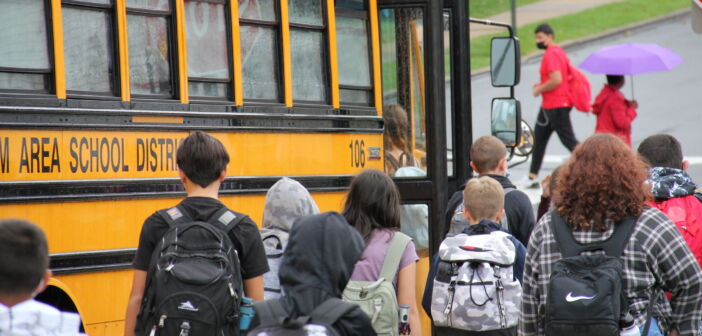As Northern Lehigh School District’s food service director, Susan Bahnick feeds 1,500 students each day. From offering pizza, to serving chicken nuggets, she strives to provide students with high quality meals that they will actually enjoy.
In the 2021-22 school year, however, Bahnick faced a new obstacle: the inability to access these lunchtime staples.
Campbell’s stopped producing its tomato soup, and Tyson chicken nuggets were nowhere to be found in grocery stores. Even spoons and forks, kitchen essentials often taken for granted, became hard to obtain.
“I’ve been in the food service industry for over 35 years,” Bahnick said. I’ve never been in a situation like this. I have never been able to ‘not get,’ so this is something brand new to all of us.”
COVID-19-induced shipping delays and a lack of food supply are threatening many Lehigh Valley schools’ ability to provide lunch. Bahnick and other food service directors are struggling to access a variety of items, from lunchtime staples like grilled cheese and tomato soup, to basic necessities like spoons and trays.
Lori Seier, Parkland School District’s food service director, is dealing with similar issues.
Seier is responsible for providing students K-12 across 12 buildings with 6,500 meals a day. With so many children to feed, Seier said she can’t simply walk into a grocery store and purchase goods herself — she would wipe them out.
“You need to feed the kids,” Seier said. “You need to give them a plastic spoon, you need to give them a napkin and you need to give them a carton of milk.”
Seier said there is always uncertainty about what food she will actually be able to get, which can frustrate students. Though she always makes sure there is food to be served, she isn’t always able to offer the same options from start to finish.
Expecting 60 cases of mozzarella sticks, Seier would get 30. Anticipating 50 cases of juice cups a week, she would receive five.
“You know, your little kiddo in third grade looks at the menu and thinks they’re going to have mozzarella sticks, but when they get to lunch, there aren’t any because they didn’t come in,” Seier said.
In addition to the unpredictability of what food will be delivered, Seier also must consider when deliveries will arrive.
Seier said she often finds out that deliveries are delayed the day of, at which point she must figure out a backup plan.
“The Wednesday before school started, I had $26,000 of delivery scheduled for that day,” Seier said. “I got notice that morning that it was being rescheduled to March of 2023.”
These last minute adjustments leave Seier little time to react, and she tries to keep extra food whenever she can. Storing food in bulk can be difficult, though, as Seier said she only has so much storage space.
“I feel like the little old lady stashing money in her mattress,” Seier said. “I’m stashing food everywhere I can.”
Sally Harris, a senior distribution supply representative at Singer Equipment, sells equipment to many K-12 schools in the area, including the consortium Bahnick and Seier are part of.
Normally, when she would place an order, Harris said typical deliveries would take between two and four weeks. They are now taking between 12 and 16 weeks. Harris said sometimes manufacturers can’t even give her a delivery estimate.
“As far as informing my schools, I’m trying to look at their orders and let them know ahead of time,” Harris said. “But sometimes another salesman comes in and swoops up all the product, and then you’re left with nothing.”
With unexpected delays and shortages, both vendors and food service directors have gotten creative. Bahnick said breakfast for lunch has become popular among students, and Domino’s pizza on Tuesdays is a fan favorite.
“If you don’t like change, this is not your industry,” Bahnick said.






Comment policy
Comments posted to The Brown and White website are reviewed by a moderator before being approved. Incendiary speech or harassing language, including comments targeted at individuals, may be deemed unacceptable and not published. Spam and other soliciting will also be declined.
The Brown and White also reserves the right to not publish entirely anonymous comments.
1 Comment
Thanks for sharing this article about the Lehigh valley schools struggle provide lunch